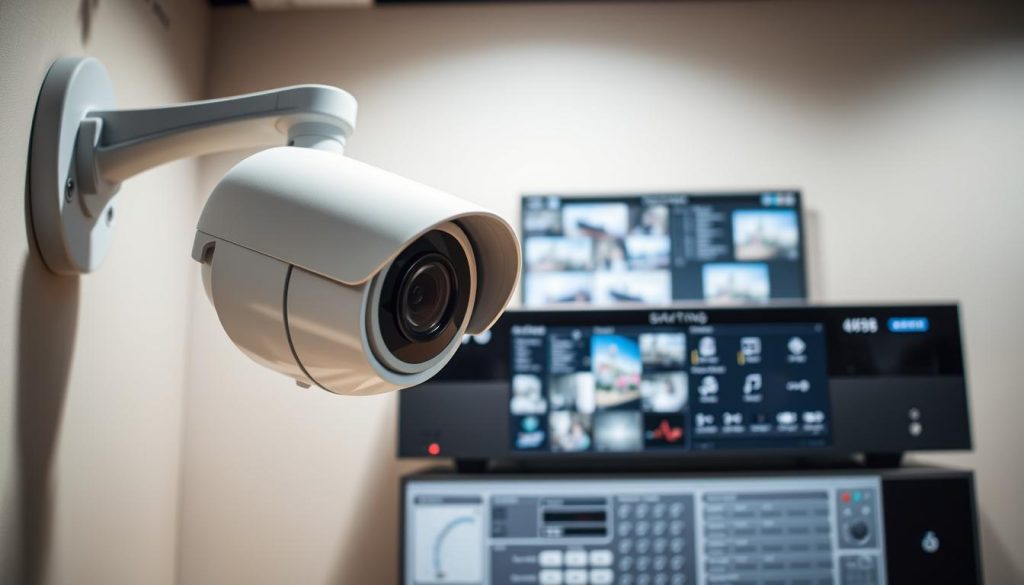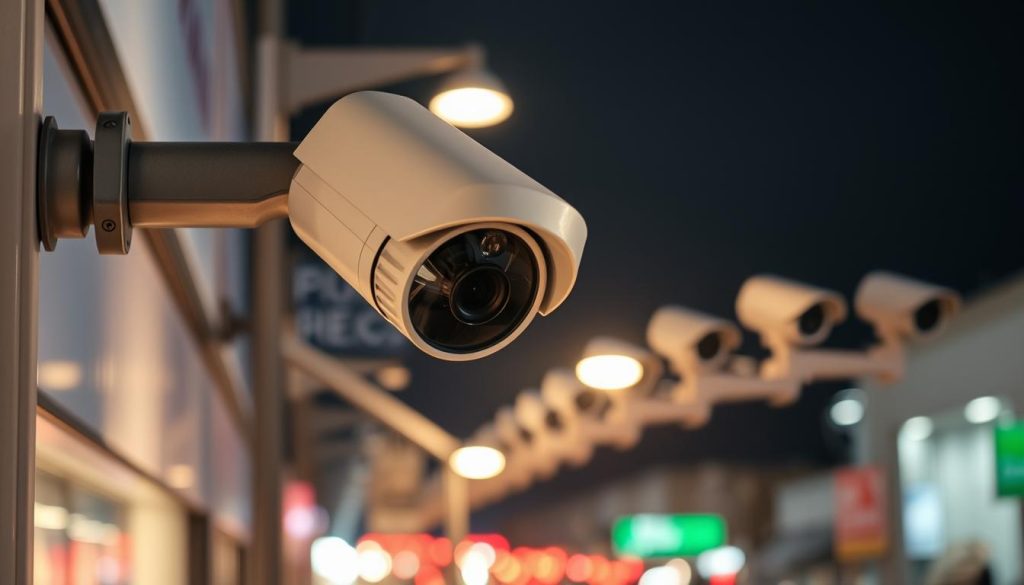Knowing when to replace your CCTV camera is key to keeping your property safe. In Singapore, theft rates are over 25%. It’s important to keep up with the latest in surveillance tech.
The average CCTV system lasts 3 to 5 years. But, systems older than five years might not meet today’s security needs. Regular maintenance can help keep your place secure.
Key Takeaways
- Regularly assess the condition of your CCTV system for optimal performance.
- Consider replacing cameras every 3 to 5 years to maintain security standards.
- Stay informed about technological advancements in surveillance systems.
- Conduct routine security camera maintenance to extend lifespan.
- Evaluate the impact of neighborhood security dynamics on your surveillance needs.
- Invest in high-quality components for better durability and performance.
Understanding the Importance of CCTV Systems in Security
CCTV systems are key to keeping places safe and secure. With more crimes happening, knowing how important CCTV systems are is vital. They help stop criminals and give proof that can be used in court.
Role of CCTV in Modern Security
Today, security depends a lot on advanced surveillance tech. CCTV cameras do more than just record; they scare off criminals. They have features like motion detection and night vision. These help keep an eye on places 24/7, from anywhere.
Benefits of Having a Reliable Surveillance System
Having a good surveillance system brings many benefits. It makes places safer, helps watch over property, and sends alerts for threats. It also helps spot scams, reduce losses, and make people feel secure.
What is the Average Lifespan of a CCTV System?
The average CCTV system lasts from 3 to 5 years. But, high-quality systems can go up to 10 years. Knowing what affects CCTV durability helps users get the most from their investment.
Factors Affecting Lifespan
Several elements influence how long a CCTV system lasts:
- Environmental conditions: Extreme weather, humidity, and dust can harm performance.
- Quality of materials: Cameras made with better parts usually last longer, even in tough spots.
- Usage patterns: Using it a lot or recording a lot can cause wear and tear.
Signs of Aging in CCTV Systems
Look out for these signs that your CCTV system might be aging:
- Blurry images: If images get fuzzy, it can make monitoring less effective.
- Recording failures: If recordings keep stopping, it means there’s a problem inside.
- Physical damage: Cracks or wear on the camera can damage its inside parts.
When Should I Replace My CCTV Camera?
Knowing when to upgrade your CCTV is key for good security. Look out for signs like poor image quality or constant problems. Keeping your system in check helps spot when it’s time for a new one.
Indicators That It’s Time for an Upgrade
There are clear CCTV upgrade indicators to watch for. These include:
- Lower image quality.
- More technical issues.
- Can’t work with new software.
- Can’t connect with new tech.
By paying attention to these signs, you can replace your cameras on time. This keeps your place safe and secure.
Regular Check-Ups and Their Importance
Regular checks are vital for your CCTV’s long life. Surveys show that “98% of system failures could be avoided with regular checks.” This means keeping your system in top shape is a must.
It’s best to inspect your CCTV every three years. Or sooner if you notice problems. Regular maintenance reduces risks and boosts your property’s safety.
Factors Influencing CCTV System Lifespan
Several factors affect a CCTV system’s lifespan. Knowing these can help you choose the right surveillance setup. The quality of components is key to a system’s durability. Environmental conditions and usage patterns also play big roles in how long a CCTV system lasts.
Quality of Components
High-quality components are vital for a CCTV system. The durability of each part affects the system’s lifespan. Better materials mean less damage from outside stress.
Systems with low-quality parts often fail sooner. This means more frequent replacements. Keeping an eye on these components can improve system longevity.
Environmental Factors and Usage Patterns
Outdoor CCTV systems face many environmental challenges. Weather like rain, heat, and humidity can harm the equipment. It’s important to understand how these factors affect a system’s lifespan.
How often cameras are used also matters. Systems used a lot will show wear faster than those used less. This is due to CCTV usage patterns.
CCTV System Longevity: Key Maintenance Practices
To keep a CCTV system running well, it’s key to follow good maintenance habits. This means doing regular camera checks and updating software. Being careful can make the system work better and avoid sudden failures.
Regular Camera Inspections
Checking cameras often is critical for a CCTV system’s success. Technicians should look at connections, cables, and lenses for damage. Experts say this can stop up to 67% of problems before they start.
Regular checks also help find issues early. This keeps the system running smoothly.
Importance of Firmware and Software Updates
Keeping up with firmware and software updates is vital. These updates often add security and make the system work better. Keeping software current helps protect against threats and makes the equipment last longer.
Systems that get updates regularly can last up to 30% longer than those that don’t.
Identifying the Right Time for CCTV System Replacement
Knowing when to replace a CCTV system is key to keeping surveillance effective. New technology brings features that boost security. Staying current with CCTV upgrades helps systems work better and reduces risks from old gear.
Technological Advances Triggering Upgrades
Technology keeps getting better, and so do CCTV systems. Systems over five years old might not keep up. New features like better images and smart analytics are vital for fighting off new threats.
Upgrading CCTV systems lets users get reliable recordings and strong performance. Older systems just can’t match these new standards.
Impact of Neighborhood Security Dynamics
Changes in neighborhood security can lead to the need for new CCTV systems. If crime rates go up or community safety changes, you might need better surveillance. A modern system with top-notch features not only boosts security but also scares off criminals.

Understanding CCTV System Durability
Knowing how long a CCTV system lasts is key to good security. The system’s life depends on its build quality and parts. Choosing high-quality materials means the system lasts longer and works better in tough conditions.
Influence of Build Quality and Housing
The strength of a CCTV system affects how long it lasts. Good housing keeps parts safe from moisture, dust, and extreme heat. High IP ratings mean the cameras can handle outdoor weather well.
A strong build makes the system more reliable over time.
Choosing the Right Components for Longevity
Picking parts that last longer helps the CCTV system last longer. Cameras made from polycarbonate and aluminum can handle wear and bad weather. Choosing durable parts saves money and boosts security in the long run.
Maximizing CCTV System Longevity
Effective management is key to making CCTV systems last longer. Good CCTV data management keeps footage safe and boosts system performance. Without it, systems face big risks that can make them less effective, which is bad for security.
Optimal Storage and Data Management
Choosing the right storage for CCTV systems is vital. Regular backups of footage are a must to keep recordings safe. Experts say using advanced storage with redundancy helps avoid data loss.
By using a structured CCTV data management approach, you can keep important info safe. This makes sure your system works smoothly.
Power Supply and Backup Considerations
A steady power supply is essential for CCTV systems to work without pause. Using Uninterruptible Power Supplies (UPS) protects against power outages. This keeps recordings going without a hitch.
High-definition cameras need a strong UPS to keep up their quality. Having a reliable power source helps your CCTV system last longer. This protects your investment in security technology.
Cost Considerations for CCTV System Longevity
When planning for your CCTV system’s long life, knowing the costs is key. Start by budgeting for CCTV maintenance. This includes setting aside money for regular checks and fixes. Having a budget helps keep your system running smoothly and effectively.
It’s also important to do a cost-benefit analysis for your CCTV. Think about the long-term costs of repairs and upgrades against the initial cost of quality parts. Choosing better parts might cost more upfront, but it can save you money and hassle later.
In Singapore’s climate, a custom maintenance plan is vital. The humidity and heat can affect your CCTV system. So, budget for protective measures. Smart financial planning for your CCTV can boost security and save you money in the long run.

